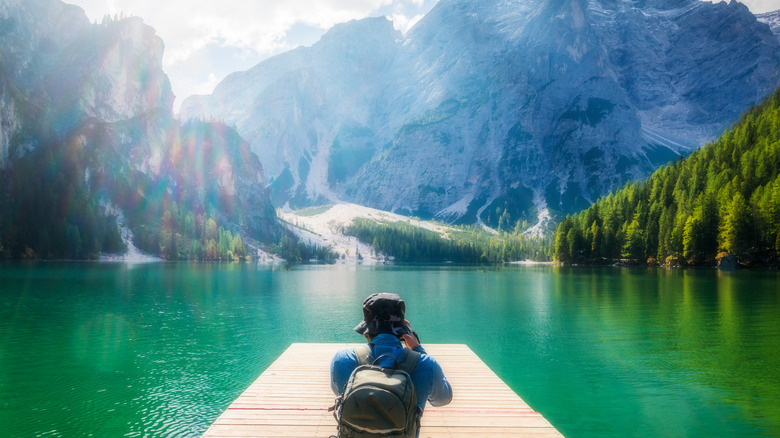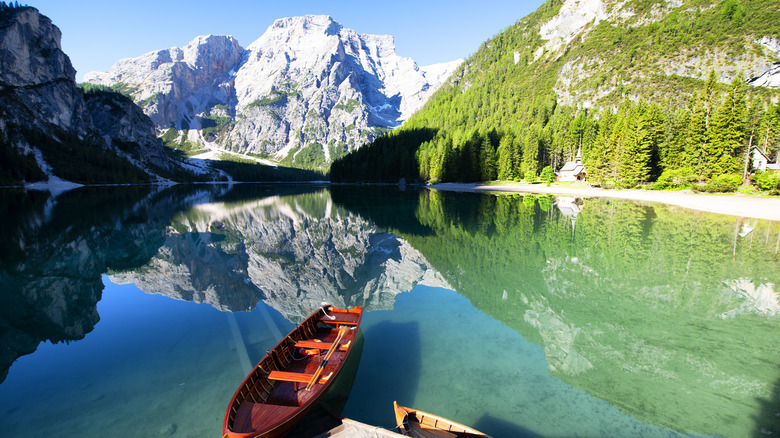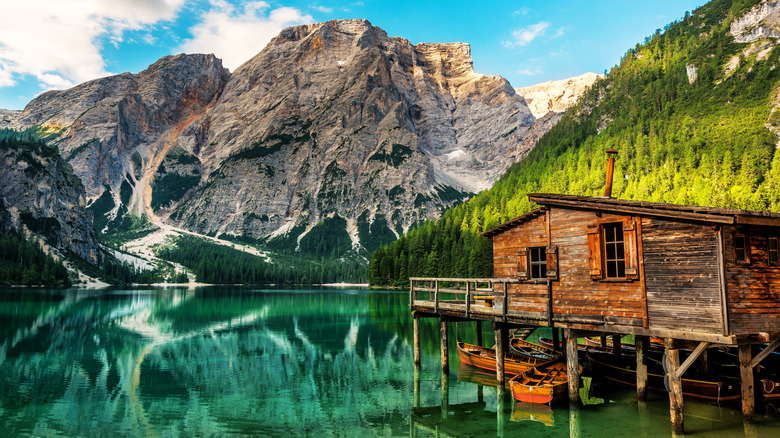Have you ever dreamed of drifting on a boat across a lovely Italian lake the color of emeralds and aquamarines? Imagine snow-topped mountains and alpine forests in the background as your craft floats lazily across the mirrored surface, with fresh air in your lungs and peace in your heart. If this sounds like an absolute dream, we have a perfect spot for you.
Set in the Northern Dolomite mountains, three hours north of Venice and just under four hours from Munich, Germany, there is a sparkling gem of a lake that is part of the Fanes-Sennes-Braise Nature Park. It’s called Lago di Braies in Italian and Pragser Wildsee in German (both languages are spoken here, as well as Ladin). Set at 4,908 feet above sea level, this 77-acre lake is an absolute dream. It’s complete with a chapel that looks like it came right out of a fairytale, a hotel on the lake, a boat house, and a beautiful path to hike. While you can’t swim in it, there is plenty to do and some magical pictures to take. There is also a lovely myth associated with the area. Let’s take a look at Lago di Braies, what you need to know before you visit, and what you can do there.
The magic of Lago di Braies

The Dolomites have some gorgeous lakes, like the mesmerizing rainbow-colored Lago di Carezza, and Lago di Braies is no exception. This place has some stories surrounding it. One myth details outsiders mining for gold in the area, upsetting the local shepherds who tried to steal it. The miners supposedly dumped it in the lake, and going by the sparkle of these waters, it’s easy to see why. There is also a story about Nazi gold being dumped here, as it was used as a base during World War II.
The lake has an average depth of 56 feet, though it varies in areas. You can’t swim here, though you might not have wanted to anyway, as the water doesn’t get much above freezing for most of the year. It hardly matters, as everything here is so beautiful. The nearby Cappella di Maria (or Marienkapelle in German) was built in 1904, though it looks like it was taken out of a fairytale. There is a spot on the east side that you can visit if you take the 2.5-mile path around the lake to a display of cairns. There are even picnic tables on the path, and you can bring your dog to feast with you. If you want a more robust hike, you can try the Croda del Becco (Seekofel) summit, an 11.2-mile roundtrip with 4,600 feet of elevation. Camping is prohibited.
What to know about Lago di Braies

The weather here is bracing, with highs around 60 degrees Fahrenheit in the summer and colder the rest of the year, with snow and ice in the winter. Spring is the best time to visit the Dolomites (with fall right behind), as the water is higher, with flowers in the spring and changing leaves reflected in the water in the fall. Sunrise and early morning are best for pictures. The lake is understandably very popular, so mornings are when you’ll have more of it to yourself.
There are (paid) bathrooms around the lake, as well as the delightful Hotel Lago di Braies. If you stay at the hotel, you get free access, and a free ski bus to Plan de Corones and Monte Elmo, free bikes, and free fishing permits. You’ll also get guaranteed parking at the closest parking lot, which can be pricey, though the lake is free. Be sure to pre-book this spot, especially during the high season. You can take a bus here as well, and that’s good because the road is shut down for a lot of the day from mid-July through mid-September to cut down on overcrowding. You can rent boats, and it’s around €50 for 30 minutes at the boat house. If you want a snack, you can grab something at the hotel’s restaurant or the bistro at the entrance to the lake.

